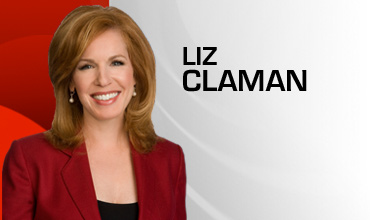Liz Claman
- Personalities
- Alexis Glick
- Neil Cavuto
- David Asman
- Cheryl Casone
- Dagen McDowell
- Liz Claman
- Adam Shapiro
- Ashley Webster
- Charles Payne
- Brian Sullivan
- Cody Willard
- Connell McShane
- Dave Ramsey
- Elizabeth MacDonald
- Eric Bolling
- Jeff Flock
- Jenna Lee
- Nicole Petallides
- Peter Barnes
- Rebecca Diamond
- Rich Edson
- Robert Gray
- Sandra Smith
- Shibani Joshi
- Stuart Varney
- Tom Sullivan
- Tracy Byrnes
- On Air
Liz Claman

Liz Claman joined FOX Business Network (FBN) as an anchor in October 2007. Her debut included an exclusive interview with Berkshire Hathaway CEO and legendary investor Warren Buffett.
Before joining FBN, Claman served as an anchor at CNBC, most recently anchoring Morning Call and Cover to Cover. During her time at CNBC, Claman has interviewed major financial newsmakers, including Warren Buffett, Commerce Secretary Carlos Gutierrez, and former Treasury Secretary John Snow. She has also anchored Wake Up Call, Market Watch, and Today's Business. In addition, Claman is the author of "The Best Investment Advice I Ever Received: Priceless Wisdom from Warren Buffett, Jim Cramer, Suze Orman, Steve Forbes, and Dozens of Other Top Financial Experts" (Warner Books 2006).
Before CNBC, Claman served as an anchor and reporter for Boston's WHDH-TV (NBC). She was also a contributing correspondent for NBC's syndicated daytime program RealLife. Prior to that, she anchored a two-hour daily talk show, The Morning Exchange for WEWS-TV (ABC) in Cleveland. She received an Emmy for her work on The Morning Exchange.
A graduate of the University of California, Berkeley, Claman began her on-air career at WSYX-TV (ABC) in Columbus, OH as a reporter and later a weekend anchor. Earlier, she was a news associate for KCBS-TV (CBS) in Los Angeles where she was the youngest person in the station's history to win a local Emmy Award for Best Spot Producer.

FOX Translator
No data currently available.
No data currently available.
Ever been to a clearance sale at a department store and wonder how a massive store like Macy's or Saks can have 50%, 60%,
or even 75%-off sales and still remain in business? Ever wonder why that piece of cloth that an Italian designer calls a dress
can be worth $2,400, and how much it really costs to make and sell?
Ladies and gentlemen, let's talk profit margin.
Profit margin is the difference between how much it costs a company to manufacture, transport and sell its products, and how
much it sells them for. If a company made $10 million in profit of sales of $100 million, the profit margin is 10%. You get
that number by dividing the profit ($10 million) by the income ($100 million). Usually you'll hear profit margin as a percentage.
The
profit margin is a great way to tell how well a company is run. If you have a high profit margin in a company, that means
that the company's costs to make the product are low and it can withstand changes in price fairly well. Also you can use profit
margin to tell how well a company is run when you look at similar companies.
Let's say you were looking a two candy companies. One has a profit margin of 15%, off $200 million in sales. The other company has a profit margin of 7% off $400 million in sales. The $400 million candy company's profit margin shows the company is having trouble keeping costs down. It might be spending too much money on their CEO's private jet, or their sugar suppliers aren't as good as they could be. Anyway, if investors were looking at the $400 million candy company, they would be asking some serious questions.






